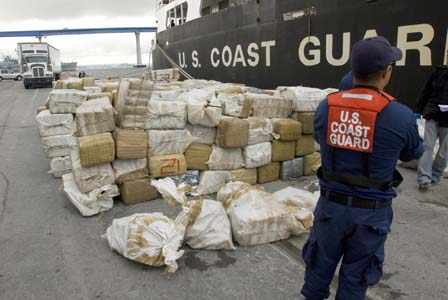Leave the War on Drug Trafficking to the Coast Guard
Despite the fact that the “war on drugs” should be fought within the boundaries of the United States through education and social reform, the “war on drugs” within the United States is really defined as protecting the entry of illegal drugs into the United States (Abadinsky, 2003). Historically the Coast Guard has been responsible for protecting the United States borders from illegal drug trafficking. Recently, however, the military has recently been pulled into the fight (Abadinsky, 2003). The military should not be involved with the war on drugs. The military already has a mission to protect the United States against enemies. This mission does not involve enforcing United States drug laws. The military also already has its hands full with fighting terrorism, involvement with Middle East conflicts, and numerous other missions.

The Coast Guard is trained in law enforcement techniques and its primary mission is to protect the United States from illegal drug trafficking (Abadinsky, 2003). One argument often made to justify military involvement with Coast Guard activities is that the Coast Guard does not have adequate resources nor technology to effectively fight the war on drugs. If the United States government is serious about the war on drugs, more money should be invested into the Coast Guard. Relying on the military to augment the Coast Guard is not a solution.

The more roles you place upon on organization, the less effective it becomes at each function. This principle applies to the Coast Guard and military. The United States government should let each do what it is experienced and trained to do best. The Coast Guard may not have the resources for the war on drugs, however, augmenting with inadequately trained and inexperienced military personnel in law enforcement is not a solution. There are numerous examples of mishaps as a result of using military forces for law enforcement. In 1997, Marines were involved with an anti-drug patrol near the Texas-Mexico border (Abadinsky, 2003). A Marine shot an 18-year-old boy because the boy heard a noise and readied his rifle (Abadinsky, 2003). The boy was merely tending a herd of goats and had the rifle for protection against snakes and wild dogs (Abadinsky, 2003).
The solution to the numerous problems associated with involving the United States military on Coast Guard missions is simple – increase Coast Guard funding. If the United States government is serious about protecting United States borders from illegal drug trafficking, the Coast Guard must receive the resources and technology they require to effectively perform their mission. The United States must also look inward for the war on drugs and focus resources on education and social reform.
Reference: Abadinsky, H. (2003). Organized crime (7th ed.). Belmont, CA: Thomson/Wadsworth Learning.









